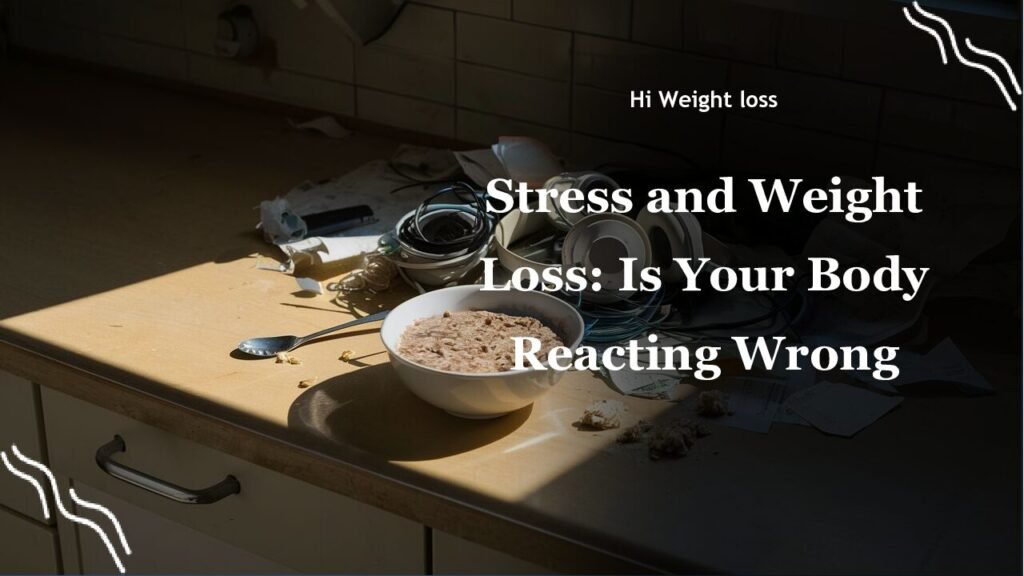Feeling overwhelmed and noticing the number on the scale dropping? You might be wondering, “Can stress make you lose weight?” It’s a common question, and the relationship between stress and weight loss is more complex than you might think. While some experience weight loss due to stress, this isn’t a healthy weight loss method and it often involves several biological and behavioral factors. In this post, we’ll unpack how stress impacts your body, what factors contribute to weight loss during stressful periods, and how to manage stress for overall well-being.
Understanding the Link: Can Stress Make You Lose Weight?
The short answer is yes, stress can lead to weight loss, but it’s not as simple as a direct cause-and-effect relationship. My own experience with intense deadlines during my master’s program left me with little appetite and noticeable weight loss. The culprit? Cortisol. The stress hormone. Understanding how this hormone interacts with other bodily functions is key to grasping the effect of stress on your weight.
How Stress Affects Your Metabolism
When you’re under stress, your body kicks into “fight or flight” mode. This response triggers the release of hormones like adrenaline and cortisol. Cortisol, in particular, can suppress non-essential functions, including digestion. This can lead to a temporary reduction in appetite and subsequently some weight loss. However, this isn’t a sustainable or healthy way to lose weight. According to Healthline, this effect is often short-lived, and the body will try to regulate itself back to equilibrium.
Think of it as your body temporarily shutting down systems that aren’t immediately needed to survive. Imagine you’re a student facing a huge exam, your digestion might take a back seat, just like it did for me when I was scrambling to finish my thesis.
Behavioral Changes and Eating Habits
Stress doesn’t just affect your hormones; it impacts your behavior too. You might find yourself losing your appetite due to stress. The feeling of stress can make you feel nauseous or make it difficult to even think about food, which is one way that stress leads to weight loss for some. Conversely, others might engage in emotional eating, reaching for high-calorie “comfort” foods or skipping meals entirely, which can still result in weight loss, but in an unhealthy manner.
I’ve noticed this myself when under pressure at work, I’d either forget to eat lunch completely, or I’d find myself reaching for unhealthy snacks. These patterns can lead to drastic shifts in weight, not always in a direction that’s beneficial.
The Hyperstimulation Effects of Stress
The “fight or flight” response not only slows down digestion, but can also lead to significant gastrointestinal discomfort. You might experience stomach pain, heartburn, diarrhea, or constipation. This hyperstimulation disrupts how your body processes and absorbs nutrients. As a result of this, a reduction in nutrient absorption can also cause you to lose weight. This process is another aspect of how stress affects weight loss.
My friend Sarah, a teacher, once described her stress during testing season as her stomach being “tied in knots.” This is a very real effect of stress, that can significantly impact your ability to eat and absorb nutrients properly.

Stress-Induced Physical Activity
Have you ever noticed yourself fidgeting more when you are stressed? The unconscious physical movements that stress can sometimes trigger include foot tapping, or even finger clicking. These small movements can burn calories, especially if you’re doing them frequently and for extended periods. Some people might also use exercise as a coping mechanism for stress, thus engaging in more physical activity which can also lead to weight loss.
I’ve personally noticed that during high-stress work periods, I pace around my office much more than normal. While this kind of activity might seem small, over time, the extra calories burned can contribute to weight loss.
The Complex Role of Cortisol Levels
Elevated cortisol levels due to stress can increase hunger and cravings for high-calorie foods. It might seem counterintuitive to the idea of weight loss, but in some cases, the body’s response to stress is to suppress appetite, which in turn can lead to unintentional weight loss. The relationship between cortisol levels and weight is indeed complex and can vary wildly among individuals.
It’s all about balance; our bodies are quite remarkable in how they attempt to adapt to different situations, but this doesn’t always mean that the end result is beneficial or healthy.
Anxiety and Its Connection to Weight Loss
Research has shown that there’s a link between anxiety and weight loss. According to a study by Scripps Research scientists, anxiety can increase metabolism and fat burning. This is attributed to the role of BDNF (brain-derived neurotrophic factor) in the brain’s anxiety circuits, which directly influences energy expenditure.
This research provides some scientific insight into the link between anxiety and weight loss. Although anxiety itself isn’t a healthy way to manage weight. It is a good idea to understand why your body changes during times of heightened stress and anxiety.
The Complicated Relationship Between Stress, Weight, and Weight Loss
The relationship between stress and weight loss isn’t a straightforward one, as you might have guessed. It’s influenced by a complex mix of hormonal responses, behavioral changes, and your individual biology.
Here is a table summarizing the various ways in which stress can influence weight:
| Factor | How it Impacts Weight |
|---|---|
| Metabolic Changes | Cortisol release can temporarily suppress digestion, leading to weight loss. |
| Behavioral Shifts | Changes in appetite (either reduced or increased), unhealthy eating habits, and skipped meals can affect weight. |
| Gastrointestinal Issues | Hyperstimulation can cause discomfort, disrupt nutrient absorption, and result in weight loss. |
| Physical Activity | Unconscious fidgeting and/or increased exercise can result in burning more calories. |
| Cortisol Levels | May increase hunger and cravings, but can also suppress appetite in some cases, resulting in weight loss. |
| Anxiety | Can increase metabolism and fat burning, potentially leading to weight loss. |
It is also worth noting that, while these factors can contribute to weight loss, they also might lead to weight gain for some people.
The Importance of Managing Stress for Sustainable Weight Management
While stress can cause weight loss in some cases, it’s not a healthy weight management strategy. In fact, chronic stress can negatively affect your body in many ways. For long-term, healthy weight management, it is crucial to find healthy ways to reduce stress.
I personally find that exercise, even a simple walk in nature, can be incredibly beneficial. Mindfulness techniques, like taking a few minutes each day to practice deep breathing, can make a big difference too.
Here is an embedded video that you may find helpful:
Conclusion
Yes, stress can cause weight loss, however, it is often a result of a complex interplay of hormones, behavioral shifts, and physiological changes. It is often accompanied by other detrimental factors like digestive issues, poor nutrient absorption, and mental strain. The short-term weight loss that may occur due to stress is neither sustainable nor healthy. It’s essential to address stress through healthy coping strategies, such as exercise, mindfulness, and a balanced diet. Prioritizing your overall well-being will ultimately lead to healthier weight management and a happier life. Are you ready to start managing your stress effectively? Share this article with anyone who you think might find it useful!
FAQ
Can chronic stress lead to weight gain?
Yes, chronic stress can lead to weight gain for some people, as stress can lead to increased cravings for high-calorie foods, and the body’s physiological changes can lead to fat accumulation.
What are some healthy ways to manage stress?
Healthy ways to manage stress include regular exercise, mindfulness practices (like meditation), and maintaining a balanced diet.
Is stress-induced weight loss a healthy way to lose weight?
No, stress-induced weight loss is not a healthy way to lose weight. It can be accompanied by negative physical and mental effects, and is not a sustainable strategy for long-term weight management.
How does cortisol affect weight?
Cortisol, released during stress, can suppress digestion and reduce appetite in some cases, which might lead to temporary weight loss. However, it can also increase hunger and cravings for high-calorie foods, which can lead to weight gain in the long term.
What is BDNF, and how does it relate to anxiety and weight loss?
BDNF, or brain-derived neurotrophic factor, is a protein that plays a role in the brain’s anxiety circuits and can increase metabolism and fat burning, potentially leading to weight loss.



